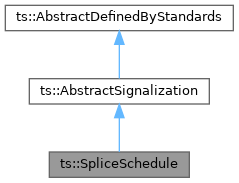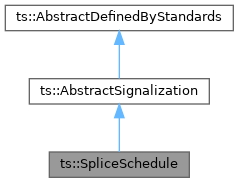Representation of an SCTE 35 SpliceSchedule command.
More...
#include <tsSpliceSchedule.h>
|
|
using | EventList = std::list< Event > |
| | A list of splice Event structures.
|
| |
| using | UTCByComponent = std::map< uint8_t, uint32_t > |
| | A map of 32-bit UTC time values, indexed by 8-bit component tags.
|
| |
|
|
static constexpr const UChar * | XML_GENERIC_DESCRIPTOR = u"generic_descriptor" |
| | XML tag name for generic descriptors.
|
| |
|
static constexpr const UChar * | XML_GENERIC_LONG_TABLE = u"generic_long_table" |
| | XML tag name for generic tables with long sections.
|
| |
|
static constexpr const UChar * | XML_GENERIC_SHORT_TABLE = u"generic_short_table" |
| | XML tag name for generic short sections.
|
| |
Representation of an SCTE 35 SpliceSchedule command.
- See also
- ANSI/SCTE 35, 9.3.2.
◆ UTCByComponent
A map of 32-bit UTC time values, indexed by 8-bit component tags.
Used when the program is splice component by component, not as a whole.
◆ display()
Display the splice insert command.
- Parameters
-
| [in,out] | display | Display engine. |
| [in] | margin | Left margin content. |
◆ deserialize()
| int ts::SpliceSchedule::deserialize |
( |
const uint8_t * |
data, |
|
|
size_t |
size |
|
) |
| |
Deserialize a SpliceSchedule command from binary data.
- Parameters
-
| [in] | data | Address of data to deserialize. |
| [in] | size | Size of data buffer, possibly larger than the SpliceSchedule command. |
- Returns
- Deserialized size, -1 on incorrect data.
◆ serialize()
| void ts::SpliceSchedule::serialize |
( |
ByteBlock & |
data | ) |
const |
◆ ToUTCTime()
| static Time ts::SpliceSchedule::ToUTCTime |
( |
const DuckContext & |
duck, |
|
|
uint32_t |
value |
|
) |
| |
|
static |
Convert a 32-bit SCTE 35 utc_splice_time to an actual UTC time.
- Parameters
-
| [in] | duck | TSDuck execution context. |
| [in] | value | A 32-bit SCTE 35 utc_splice_time. |
- Returns
- The corresponding UTC time.
◆ FromUTCTime()
| static uint32_t ts::SpliceSchedule::FromUTCTime |
( |
const DuckContext & |
duck, |
|
|
const Time & |
value |
|
) |
| |
|
static |
Convert a UTC time into a 32-bit SCTE 35 utc_splice_time.
- Parameters
-
| [in] | duck | TSDuck execution context. |
| [in] | value | A UTC time. |
- Returns
- The corresponding 32-bit SCTE 35 utc_splice_time.
◆ clearContent()
| virtual void ts::SpliceSchedule::clearContent |
( |
| ) |
|
|
overrideprotectedvirtual |
Helper method to clear the content of the table or descriptor.
It is called by clear(). In clearContent(), the subclass shall simply revert the value of all fields to their original values in the default constructor.
Implements ts::AbstractSignalization.
◆ buildXML()
Helper method to convert this object to XML.
It is called by toXML() only when the object is valid. The root element is already built with the appropriate XML node name. In buildXML(), the subclass shall simply populate the XML node.
- Parameters
-
| [in,out] | root | The root node for the new XML tree. |
| [in,out] | duck | TSDuck execution context. |
Implements ts::AbstractSignalization.
◆ analyzeXML()
Helper method to convert this object from XML.
It is called by fromXML() after checking the validity of the XML node name. In analyzeXML(), the subclass shall populate the C++ object from the content of the XML node. If analyzeXML() returns false, this table or descriptor object is then invalidated and cleared.
- Parameters
-
| [in,out] | duck | TSDuck execution context. |
| [in] | element | XML element to convert. |
- Returns
- True if the analysis is correct, false otherwise.
Implements ts::AbstractSignalization.
◆ isValid()
| bool ts::AbstractSignalization::isValid |
( |
| ) |
const |
|
inlineinherited |
Check if this object is valid.
- Returns
- True if this object is valid.
◆ invalidate()
| void ts::AbstractSignalization::invalidate |
( |
| ) |
|
|
inlineinherited |
Invalidate this object.
This object must be rebuilt.
◆ clear()
| virtual void ts::AbstractSignalization::clear |
( |
| ) |
|
|
virtualinherited |
This method clears the content of the table or descriptor.
Upon return, the object is valid and in the same empty state as after a default constructor.
Reimplemented in ts::AbstractTable, and ts::AbstractLongTable.
◆ xmlName()
| UString ts::AbstractSignalization::xmlName |
( |
| ) |
const |
|
inherited |
Get the XMl node name representing this table or descriptor.
- Returns
- The XML node name.
◆ toXML()
This method converts this object to XML.
When this object is valid, this method creates a root node with the default XML name and then invokes buildXML() in the subclass to populate the XML node.
Important: Implementers of signalization classes shall not override this class. Implement the protected method buildXML() instead.
- Parameters
-
| [in,out] | duck | TSDuck execution context. |
| [in,out] | parent | The parent node for the new XML tree. |
- Returns
- The new XML element.
Reimplemented in ts::AbstractTable.
◆ fromXML()
This method converts an XML structure to a table or descriptor in this object.
In case of success, this object is replaced with the interpreted content of the XML structure. In case of error, this object is invalidated.
This method checks the name of the XML node and then invokes analyzeXML() in the subclass. Depending on the returned values of analyzeXML(), this object is either validated or invalidated.
Important: Implementers of signalization classes shall not override this class. Implement the protected method analyzeXML() instead.
- Parameters
-
| [in,out] | duck | TSDuck execution context. |
| [in] | element | XML element to convert. |
Reimplemented in ts::AbstractTable.
◆ definingStandards()
Get the list of standards which define this object.
- Parameters
-
| [in] | current_standards | Current standards in the stream so far. This is a hint which may help the object to determine to which standard it belongs. This can be used by objects with slightly different semantics depending on the standard. |
- Returns
- A bit mask of standards.
Implements ts::AbstractDefinedByStandards.
Reimplemented in ts::AbstractDescriptor.
◆ DataName()
Get a name from a specified section in the DVB names file.
- Parameters
-
| [in] | xml_name | Table or descriptor name, as used in XML structures. |
| [in] | section | Name of section to search. Not case-sensitive. The actual section in the names file is prefixed by the XML name, followed by a dot. |
| [in] | value | Value to get the name for. |
| [in] | flags | Presentation flags. |
| [in] | alternate | Display this integer value if flags ALTERNATE is set. |
| [in] | bits | Optional size in bits of the displayed data. Used in replacement of the "Bits=XX" directive in the .names file. |
- Returns
- The corresponding name.
◆ dataName()
Get a name from a specified section in the DVB names file for that signalization structure.
- Parameters
-
| [in] | section | Name of section to search. Not case-sensitive. The actual section in the names file is prefixed by the XML name of the structure, followed by a dot. |
| [in] | value | Value to get the name for. |
| [in] | flags | Presentation flags. |
| [in] | alternate | Display this integer value if flags ALTERNATE is set. |
| [in] | bits | Optional size in bits of the displayed data. Used in replacement of the "Bits=XX" directive in the .names file. |
- Returns
- The corresponding name.
The documentation for this class was generated from the following file:



